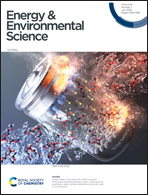Designing biomass-integrated solid polymer electrolytes for safe and energy-dense lithium metal batteries
Abstract
The solid polymer electrolyte (SPE) as a key battery component promises advances in solid-state lithium (Li) metal batteries (SSLMBs). Biomass, with a naturally derived structure design, composition and physical/chemical properties, exhibits advantages over the traditionally synthesized polymers in SPE. Biomass-integrated SPEs are, therefore, expected to address the key issues of SPE (e.g., low ionic conductivity, poor mechanical properties, and environmental concerns), promoting the development of safe, sustainable, and energy-dense SSLMBs. However, reviews on such perspectives are presently limited. This review summarizes the applications of renewable biomass in SPEs, from the partial to the complete substitution of synthetic polymers. The sources and properties of biomass are considered, providing a new understanding of the roles of biomass as an additive, the skeleton, and the main material of SPEs. Moreover, the correlation between biomass and the improved performances of SPEs (e.g., ion conduction and mechanical properties) is discussed. The design protocols for SPEs with desirable properties are also highlighted based on the multifunctionalities of biomass, proposing potential revolutionary strategies. This perspective provides enlightenment for the rational design of biomass-based SPEs, accelerating the sustainable development of advanced energy storage devices.



 Please wait while we load your content...
Please wait while we load your content...